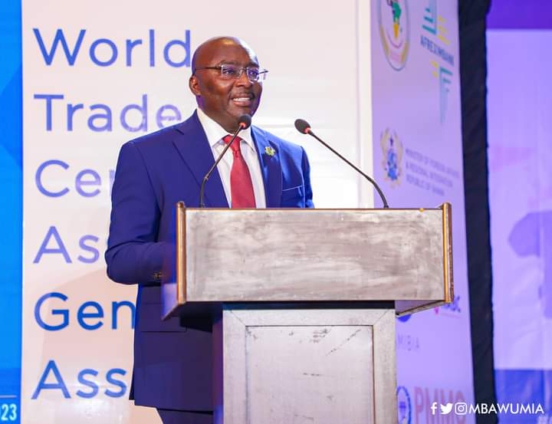Vice President Dr Mahamudu Bawumia has underscored the government's dedication to addressing challenges within the informal economy through the implementation of the Ghana Card, a vital component of the digitalisation agenda.
Speaking at the 20th edition of the Ghana Club 100 Awards on Saturday, December 9, the NPP flagbearer highlighted the negative impacts of the informal economy, such as age cheating, identity fraud, and the proliferation of counterfeit documents like insurance, birth certificates, and passports.
Dr. Bawumia emphasised the importance of transitioning from an informal economy to a more disciplined and transparent system.
He outlined the issues faced in an informal economy, including corruption, lawlessness, tax evasion, and an unbanked society. To tackle these challenges and unlock the transformative potential of the economy, he noted that the government embarked on a formalisation process.
The Vice President explained that the digitalisation initiative played a pivotal role in this formalisation process, with the Ghana Card serving as its anchor.
He added that by digitising government services through Ghana.gov.gh and other initiatives, the government aims to enhance transparency, clarity, and efficiency in the system.
Dr Bawumia stated that these measures contribute to reducing corruption, as services can be accessed without the need for bribes.
“You look at an economy in the informal sense which turned to be undisciplined, the society is undisciplined because the economy is informal and there are no consequences for bad actions, you have a society where corruption prevails, you have lawlessness, you have a tax dodging society, you have an unbanked society, you have a loan repayment dodging society, identity fraud, people assuming identities of others, lack of address systems, age cheating, fake insurance, fake birth certificates, fake passports, no functional address systems, ghost workers on government payrolls.”
“These ills of the informal economy that we really inherited made it very difficult for the economy to transform to its potential. That is why we set out to formalize the economy to make sure that the economy works in a transparent system. In that area of formalisation of the economy we realized heavily on digitalization of the economy to formalize the economy.”
Latest Stories
-
KNUST’s Prof. Reginald Annan named first African recipient of World Cancer Research Fund
26 seconds -
George Twum-Barimah-Adu pledges inclusive cabinet with Minority and Majority leaders
48 mins -
Labourer jailed 5 years for inflicting cutlass wounds on businessman
49 mins -
Parliament urged to fast-track passage of Road Traffic Amendment Bill
49 mins -
Mr Daniel Kofi Asante aka Electrician
50 mins -
Minerals Commission, Solidaridad unveils forum to tackle child labour in mining sector
55 mins -
Election 2024: Engagement with security services productive – NDC
56 mins -
Retain NPP for the good of Ghana – Rebecca Akufo-Addo
57 mins -
‘Let’s work together to improve sanitation, promote health outcome’ – Sector Minister urges
58 mins -
Ellembelle MP cuts sod for six-unit classroom block at Nkroful Agric SHS
1 hour -
‘I’ll beat the hell out of you if you misbehave on December 7’ – Achiase Commanding Officer
1 hour -
AFPNC leads the charge on World Prematurity Day 2024
1 hour -
Court remands unemployed man over theft of ECG property
1 hour -
Election security rests solely with the police – Central Regional Police Command
1 hour -
NCCE engages political youth activists at Kumbungu on tolerance
1 hour

